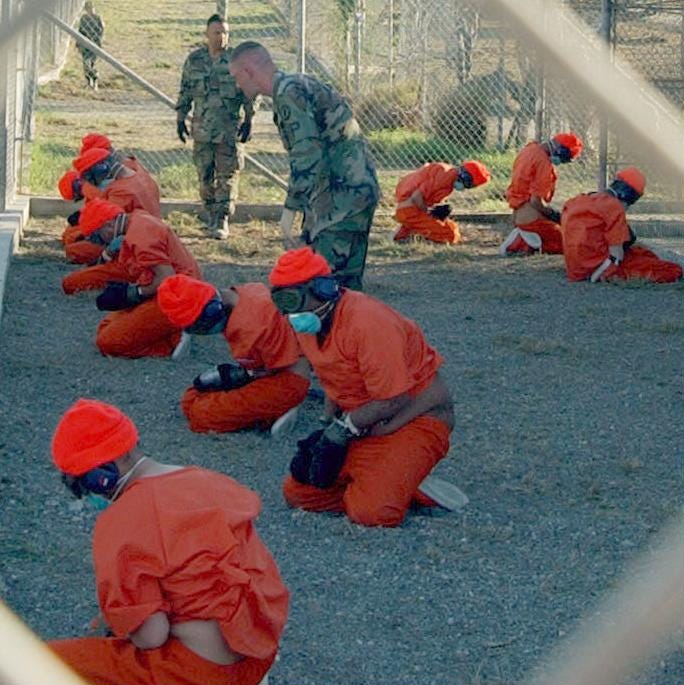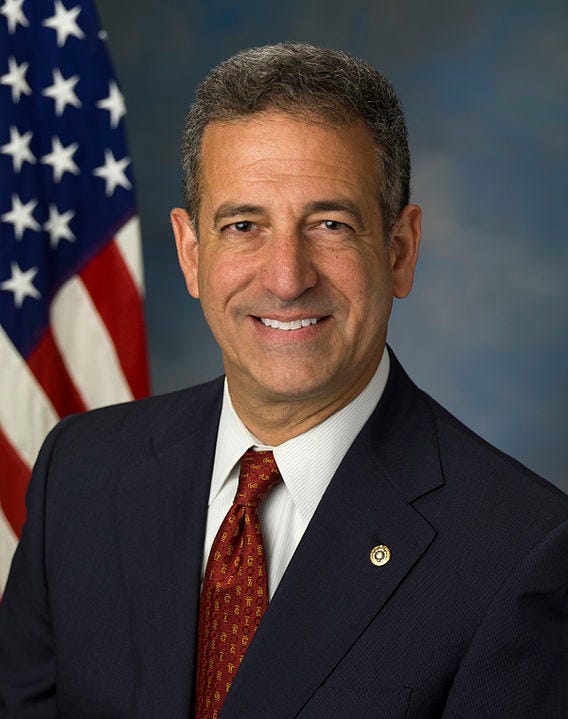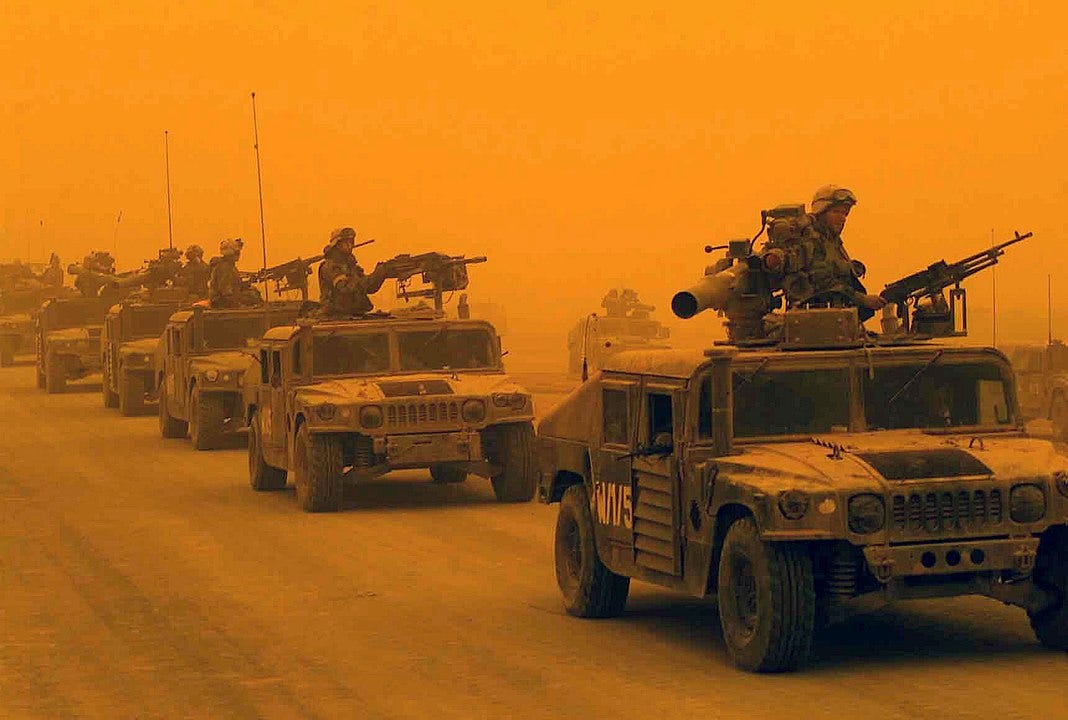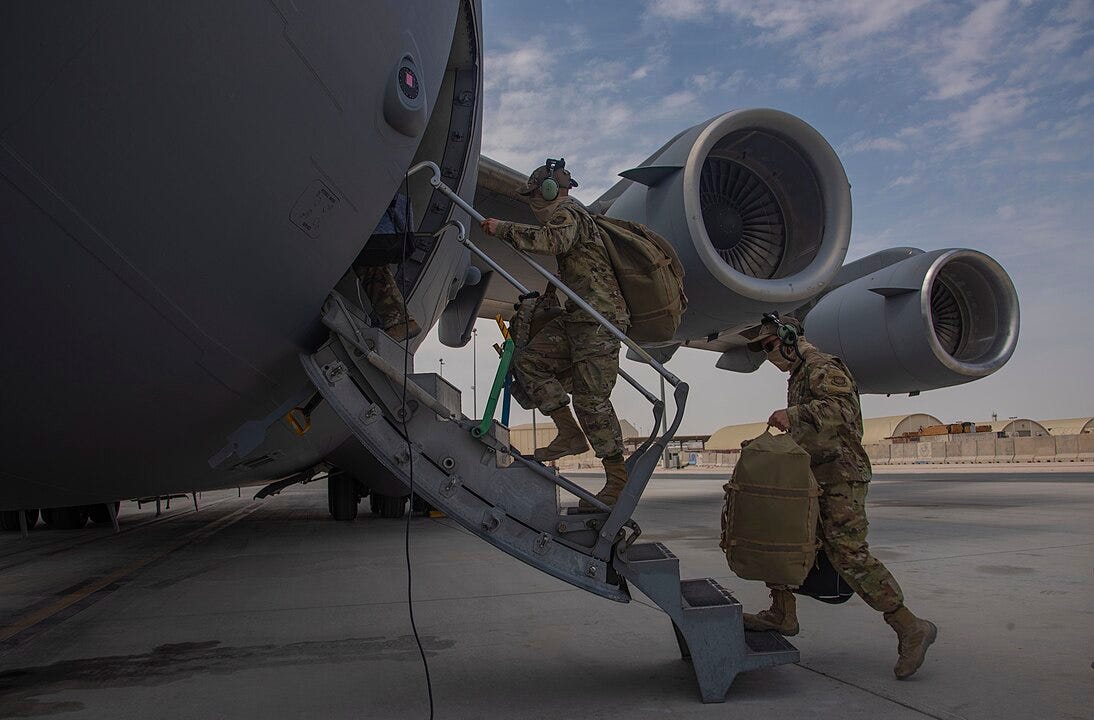The fight against terrorism: a good excuse or a legitimate reason for mass surveillance?
And did Bin Laden win ?
"Usurpers always bring about or choose [times of] trouble to pass, through public fear, destructive laws that the people would never pass in cold blood.
The choice of the moment [...] is one of the surest characteristics by which we can distinguish the work of the legislator from that of the tyrant."
Jean-Jacques Rousseau, The Social Contract
Note : After the 14-part series in which we looked at how nation-states are being disrupted by the Internet and globalization, and a 4-part series on why now is the worst time for them, I have concluded that there are two main ways for governments to respond to these disruptions:
Increasingly control what their residents do, via permanent digital surveillance and the use of AI and machine learning (China's way)
Accept that their role will diminish and treat their residents more like customers
In this new series, corresponding to chapter 4 of my forthcoming book, we analyze the (very) slippery slope towards generalized surveillance to which many countries, including the most democratic, are committing themselves.
Here are the 11 articles of the series :
Since terrorism is the most common reason given for all these freedom-destroying measures we saw in this series, let's take a rational look at 1) the damage this phenomenon does to society, and 2) how these surveillance measures help to reduce it.
What terrorists generally want to achieve
Terrorists are characterized by the fact that they are much weaker than the enemy they are fighting.
This forces them to adopt strategies that often have these characteristics:
Asymmetrical force: Terrorist groups use asymmetrical tactics, i.e. unconventional methods to combat (much) militarily stronger opponents.
Cost-effectiveness: Terrorist actions are often designed to be "very" cost-effective. This means using relatively simple or inexpensive means (such as homemade bombs, suicide attacks, etc.) to inflict maximum damage, both material and psychological.
Provoke a response (far) more costly than the attack: Terrorists often seek to provoke a disproportionate response from their enemy, which will be costly financially, and often also politically and socially. The aim is to drain the enemy's resources, discredit them in the eyes of their own population or the international community, and provoke reactions that can be used to recruit more supporters.
Psychological and symbolic effects: Terrorist actions often aim to have a strong psychological impact, sowing fear and uncertainty. By attacking symbolic targets, they seek to demonstrate the enemy's vulnerability and call into question his ability to provide security.
Long-term and Wear: Asymmetric warfare is generally designed to be a long-term struggle. Terrorist groups hope to wear down the enemy over time, pushing them into concessions or withdrawal.
So, to be clear, even if these objectives are often accompanied by irrational goals that have no chance of being achieved, terrorists above all want to cause (far) more direct and indirect damage to their enemies than the cost in human and material resources of the attack.
An example of a terrorist attack seeking leverage
For example, in 2010, a terrorist plot to blow up two US-bound planes was uncovered thanks to Saudi Arabia's interior minister, who shared information given by an informant with the US secret service1 .
Yemeni terrorists linked to Al Qaeda had hidden a bomb in the toner of two laser printers, sent by Fedex to addresses in the USA. The bombs were designed to explode as the planes carrying them flew over the USA. The wiring of the bombs was designed so that all printer components would appear correct on X-ray, and indeed each of the packages was X-rayed without the bombs being detected2 .
The terrorists analyzed their attempt this way, in an Al Qaeda magazine (bolding is mine):
"Two Nokia mobiles, $150 each, two HP printers, $300 each, plus shipping, transportation and other miscellaneous expenses add up to a total bill of $4,200. That is all what Operation Hemorrhage cost us [...].
This supposedly foiled plot will without a doubt cost America and other Western countries billions of dollars in new security measures. That is what we call leverage[…].
This strategy of attacking the enemy with smaller, but more frequent operations is what some may refer to as the strategy of a thousand cuts. The aim is to bleed the enemy to death3."
Three quarters of terrorist attacks in Europe between 1994 and 2013 cost less than $10,000. This estimate includes all costs associated with the attack, such as travel, communication, storage, acquisition of weapons and bomb-making materials4.
In addition, it is estimated that between 2001 and 2008, the world's governments spent around 70 billion dollars in direct costs to increase their homeland security against terrorism, with very few results5 .
These are clear examples of the terrorists' major strategy of gaining an asymmetrical advantage, particularly in terms of the cost of their attack vs. the cost of the reaction of those attacked.
And, as we shall see, the reality is that unfortunately it is often the reaction to attacks that inflicts the most direct and indirect damage, thus helping terrorists to achieve their initial objective.
The American response to the September 11 attacks : a victory for bin Laden?
The September 11 attacks killed 2,977 people and injured thousands more6 . This is more than the Japanese attack on Pearl Harbor7 .
343 New York firefighters and 71 police officers were among the victims8 .
So it's easy to understand why Americans, and the rest of the world, were so moved. But was the American reaction effective?
First of all, the total cost of the September 11th terrorist attacks was between $400,000 and $500,000 for Al Qaeda9 .
In 2001, the terrorist organization's annual budget was estimated at $30 million per year10 (for comparison, the 2001 US defense budget was $335,000 million11 ).
The direct cost of these attacks to the United States has been estimated at $21.8 billion, or 0.2% of its 2001 GDP, half the economic cost of the 1995 Kobe earthquake in Japan, which also killed twice as many people12 .
Bad but clearly not insurmountable for the mighty USA.
The indirect human and material costs caused by American reactions
According to studies by the International & Public Affairs Department at Watson Institute Brown University:
More than 940,000 people died directly in the post-9/11 wars.
An estimated 3.6 to 3.8 million people died indirectly in war zones after September 11, bringing the total death toll to at least 4.5 to 4.7 million, and there's more to come: there are new victims every day.
More than 432,000 civilians were killed in the fighting.
38 million war refugees and displaced persons.
The cost of the U.S. federal government's post-9/11 wars is over $8 trillion. This amount does not include the future interest costs of borrowing for the wars.
At least four times as many active-duty military personnel and veterans of post-9/11 conflicts have died by suicide than in combat.
Just for a clear comparison, here are the human and material costs of the initial attack, and of the response, written in the same unit:
You'll note that in terms of the cost in human life and financial cost, those of September 11 are not visible on the graph when compared with the ones caused by the American response.
Because :
The American response caused 1,511 times more casualties than the initial attack.
It cost the U.S. government sixteen million times more than the terrorist attack cost Al Qaeda. Yes, that's not a typo, 16,000,000 times more expensive.
Bin Laden had a number of objectives in ordering his attacks, including :
To challenge the US military presence in the Middle East
To provoke the US into war, to draw it into a costly and protracted conflict, in order to weaken and then exhaust its resources
To unite Muslims against the West
Respond to US foreign policies, including US support for Israel, sanctions against Iraq, and the US presence in Saudi Arabia
To create a sense of fear and insecurity, to show that even the most powerful are not immune to attack
To damage the US economy13 .
While some objectives failed because they were unrealistic anyway (such as ending the US military presence in the Middle East, or uniting Muslims against the West), it has to be said that objectives 2 and 5 were unfortunately a resounding success, and that the success of objective 2 was largely due to the completely disproportionate reaction of the US administration.
Objective 6 was also a success, given the cost of the war and all the indirect disruption it caused.
What's more, another of Bin Laden's objectives was for the American reaction to discredit the United States in the international community, and it has to be said that this is what happened, notably with :
The establishment of the Guantanamo detention camp on the territory of the US military base in Cuba
Taking advantage of its status as a territory outside the United States, it has held 780 prisoners without trial since 2002.
In 2023, 30 prisoners were still being held there, some of whom had been there for more than 20 years and had not been able to benefit from any trial14 .
This directly contradicts the principles of law on which the USA was founded, undermining its legitimacy. Bin Laden explicitly said in his 2002 letter15 : "What is happening at Guantanamo is an historic disgrace to America and its values, and it screams in the face of you hypocrites, 'What is the value of your signature on an agreement or treaty?"."
You don't have to agree with Bin Laden's general rhetoric to recognize that he has a point here.
Amnesty International explicitly states16 : "Since the beginning of the 'war on terror', the prohibition of torture and ill-treatment has been weakened. The Guantánamo detention center has become a symbol of human rights violations such as torture and illegal detention".
Not great for one of the countries that is supposed to be a champion of freedom and respect for rights.
The Patriot Act, passed in a hurry - and emotionally - by the US Congress
Which gave considerable new powers to the government, which had often been denied by Congress in the past17 , and which contained numerous provisions that were later declared unconstitutional18 by U.S. courts19 .
This law was very20 controversial21 , and marred the reputation of the United States as a country respectful of civil liberties and the separation of powers, with many documented cases of abuses allowed by it, such as :
Adam McGaughey, webmaster of a fan site for the TV series "Stargate SG-1", was charged with copyright infringement and wire fraud, and the FBI used a provision of the Patriot Act to obtain financial records from his ISP (!) - a far cry from the fight against terrorism22 .
A U.S. Justice Department report in 2003 revealed the expanded use of Patriot Act powers in more than a dozen non-terrorism cases, and Justice Department officials have indicated that these cases represent only a small sample of the hundreds of non-terrorist cases that have been prosecuted under the Act, less than two years after it was passed23 .
The FBI has issued tens of thousands of "national security letters" and obtained a million financial records, as well as credit records, employment records and, in some cases, health records of customers of targeted Las Vegas businesses, including casinos, storage warehouses and car rental agencies. A national security letter can be issued by any FBI agent of sufficient rank, at his or her discretion, and does not require the intervention of a judge or probable cause, as is the case with a search warrant24 .
One of the senators, Russ Feingold, said during the debate preceding the vote on this law:
"There's no doubt that if we lived in a police state, it would be easier to catch terrorists.
If we lived in a country where the police were allowed to search your home at any time and for any reason, if we lived in a country where the government had the right to open your mail, listen to your phone conversations or intercept your e-mail communications... the government would probably discover and arrest more terrorists, or would-be terrorists, than in the past.
But it would not be a country we would want to live in."
He was not listened to by his colleagues, and was the only senator not to vote for the PATRIOT Act29 .
To be fair, U.S. legislators had provided for certain clauses of the law to expire on December 31, 2005, thanks in particular to the efforts of Senator Richard Armey30 .
It was laudable to build into the law the understanding that the emotion of the moment was strong, and that these provisions had to be reviewed with a cool head. Despite this, the government proved incapable of resisting the power of the ring, as virtually all sections were renewed in 2005, 2011 (after President Barrack Obama extended it for a year in 201031 ), and 2015.
Finally, the law expired in 2020, as Donald Trump threatened to use his veto against the law and encouraged Republican senators not to vote for its renewal32.
However, the FISA Amendments Act of 2008 and the USA Freedom Act of 2015 are still in effect, and give the U.S. government powers originally given by the Patriot Act, as well as others33 .
The creation of CIA "black sites" in various countries around the world
Secret detention facilities used by the US government to imprison without trial and torture people believed to have taken part in terrorist attacks - these tortures were modestly called "enhanced interrogation techniques".
Around 50 prisons in 28 countries, plus 25 in Afghanistan and 20 in Iraq, as well as 17 ships, have been used to detain terrorism suspects since 2001, bringing the total to over 10034 A Senate committee investigated its abuses and published a report in 201435 . Here is a selection of its findings, copied verbatim from the report (emphasis mine):
"The CIA's use of its enhanced interrogation techniques was not an effective means of acquiring intelligence or gaining cooperation from detainees.
The CIA's justification for the use of its enhanced interrogation techniques rested on inaccurate claims of their effectiveness.
The interrogations of CIA detainees were brutal and far worse than the CIA represented to policymakers and others.
The conditions of confinement for CIA detainees were harsher than the CIA had represented to policymakers and others.
The CIA repeatedly provided inaccurate information to the Department of Justice, impeding a proper legal analysis of the CIA's Detention and Interrogation Program.
[The CIA shared] classified information about the CIA's detention and interrogation program with select members of the media to thwart public criticism, shape public opinion and avoid any potential Congressional action to restrict the CIA's detention and interrogation powers and budget.
Two contract psychologists devised the CIA's enhanced interrogation techniques and played a central role in the operation, assessments, and management of the CIA's Detention and Interrogation Program. By 2005, the CIA had overwhelmingly outsourced operations related to the program.
The CIA failed to adequately evaluate the effectiveness of its enhanced interrogation techniques.
The CIA's Detention and Interrogation Program damaged the United States' standing in the world, and resulted in other significant monetary and non-monetary costs."
(You can read the report yourself here. If you're in a hurry, you can just read the conclusions in bold starting on page 12. It's damning for the CIA.
The icing on the cake was the revelation that CIA agents had hacked into the Commission's computers while it was working on the report!36)
Senator Dianne Feinstein, chairwoman of the US Senate Select Committee on Intelligence which produced the report, concludes with these words:
"It is my personal conclusion that CIA detainees were tortured, whatever the common meaning of the term. I also believe that the conditions of detention and the use of authorized and unauthorized interrogation and conditioning techniques were cruel, inhuman and degrading. I believe that the evidence of these facts is overwhelming and incontrovertible."
The introduction of generalized financial surveillance with the generalization of KYC and AML
Reversing one of the most fundamental principles of democracy, the presumption of innocence, as we saw in details in “How KYC and AML are destroying the world”.
The 2003 Iraq war
Which was launched for reasons that have clearly proved to be either mistakes (showing that the American administration is incompetent) or lies (showing that it cannot be trusted), namely the Iraqi government's possession of weapons of mass destruction, and which was perceived as a wanton aggression by the United States (because that's what it was) by a large part of the international community37 .
Investigations carried out since then have shown that it is far more likely that these "revelations" about weapons of mass destruction that never existed were lies and propaganda, dealing a further blow to the prestige of the United States38.
The creation of the Islamic State
A direct consequence of the power vacuum created by the overthrow of Saddam Hussein's government, which was the deadliest terrorist group on the planet from 2014 to 202239 , which again showed how stupid the decision to invade Iraq was.
US military withdrawal from Afghanistan in 2021
This quickly led to the fall of the American-backed government and the return of the Taliban. It can therefore be said that the war in Afghanistan consisted of 20 years of fighting by the Americans, with the result that the Taliban replaced the Taliban, a huge loss of prestige for the United States.
Conclusion : Bin Laden has in fact achieved most of its objectives
The relative decline of American power would probably already have begun without all this40 , but it was accelerated by these elements, to the point where some economists estimate that without the war in Iraq, the USA would have slowed its decline by around 10 years, prolonging the Pax Americana by that much, and allowing them to focus their resources earlier on China to counter it more effectively41 .
And beyond the reaction of the international community, the United States has also lost a great deal of prestige among many people sensitive to issues of human rights and respect for fundamental rights.
So we can clearly say that Bin Laden has perfectly accomplished two of his major objectives by triggering a disproportionate American response that :
Cost infinitely more than the cost of the attack
Greatly damaged the reputation of the United States
And we could add: and made the USA deny some of its fundamental values, corrupting its ideals and making it look like its attackers.
Because yes, everything we've just seen shows that, unfortunately, Bin Laden has won, and that a large part of his objectives have been achieved.
All this with a $500,000 budget and a few fanatical gussies armed with box-cutters.
And that it's above all the fault of the American government and its absolutely disproportionate reaction. And all of this for what?
Coming soon
In our next article, we'll look at the real damage caused by terrorism in our societies, and what answers would be really effective, rather than the mass surveillance and other ineffective and even self-defeating measures seen here.
In the meantime, feel free to follow Disruptive Horizons on Twitter, and join the tribe of Intelligent Rebels by subscribing to the newsletter :
Other articles in the series
"U.S. Sees Complexity of Bombs as Link to Al Qaeda", The New-York Times, 2010
"World Scrambles to Tighten Air Cargo Security", Der Spiegel, 2010
"Qaeda Branch Aimed for Broad Damage at Low Cost", Scott Shane, The New-York Times, 2010
"How terrorists fund their attacks - and how to stop them", Camilla Schippa, Institute for Economic and Peace, 2017
Transnational attacks were reduced by 34%, but the number of deaths remained more or less the same. "Is counterterrorism good value for money?", Bjorn Lomborg, NATO Review, 2008
2,403 victims and 1,178 injured
"September 11 memorial, New York State Intelligence Center
"The 9/11 Commission Report Final Report Of The National Commission On Terrorist Attacks Upon The United States Executive Summary", September 11th Commission, 2004
Ditto
"The Costs Of Terrorism: What Do We Know?", Paul Krugman, Priceton University, 2004
"Full text: bin Laden's 'letter to America'", The Observer, 2002
"The Guantánamo Docket", The New-York Times, 2023
Already quoted above
“Torture et guerre contre le terrorisme : Guantánamo”, Amnesty International
"Six Weeks in Autumn", Robert O'Harrow Jr, The Washington Post, 2002
"Federal Court Strikes Down National Security Letter Provision of Patriot Act", American Civil Liberties Union, 2007
"Judge rules part of Patriot Act unconstitutional", AFP, 2007
"The Patriot Act's Erosion of Constitutional Rights", Alison Siegler, 2007
"The PATRIOT Act Has Threatened Freedom for 20 Years," Patrick G. Eddington, Cato Institute, 2021
"Stargate fan-site operator busted under anti-terrorism law", Cory Doctorow, Boing Boing, 2004
"U.S. Uses Terror Law to Pursue Crimes From Drugs to Swindling", Eric Lichtblau, The New-York Times, 2003
"The Patriot Act: Business Balks", Richard S. Dunham, Business Week, 2005
"The Patriot Act: How it Hurts Democracy", Madison Racquel Wadsworth, Utah State University, 2020
"The Patriot Act Wasn't Meant to Target Parents," F. James Sensenbrenner, The Wall Street Journal, 2021, a tasty article because written by the lead author of the Patriot Act!
"Broad Coalition Calls for PATRIOT Act Surveillance Reform," Project on Government Oversight, 2019
"Rand Paul vs. the PATRIOT Act", Chris Good, The Atlantic, 2011
"Six Weeks in Autumn", quoted above
"Obama signs Patriot Act extension without reforms", Michael B. Farrell , The Christian Science Monitor, 2010
"Patriot Act surveillance powers left unrenewed after Trump threatens veto", Nicholas Fearn, Toms Guide, 2020
"A Comparative Analysis of the USA PATRIOT Act of 2001 to the USA FREEDOM ACT of 2015: Balancing Security with Liberty", Richard L. Russo, University of Central Florida, 2015.
"More Than Two-Dozen Countries Complicit In US Torture Program", Sherwood Ross, The Public Record, 2010
“CIA admits to spying on Senate”, Julian Hattem, The Hill, 2014
"Iraq war was illegal and breached UN charter, says Annan", Ewen MacAskill, The Guardian, 2004
“Hubris: The Inside Story of Spin, Scandal, and the Selling of the Iraq War”, Michael Isikoff, David Corn, 2006
"Global Terrorism Index 2023", The Institute for Economics & Peace
"You're not going to like what comes after Pax Americana", Noah Smith, a center-left American economist, 2023


















